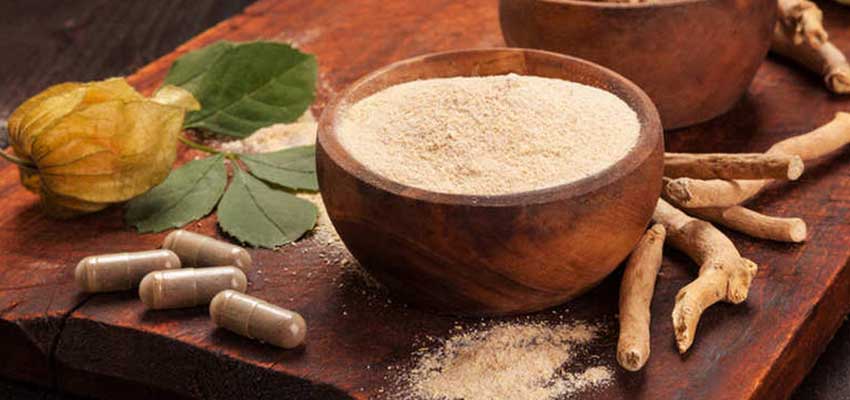
Ashwagandha: A Herbal Remedy for Stress, Anxiety, Improved Health
Tablet of Contents
Ashwagandha, sometimes known as Indian ginseng, is a typical herb used in Ayurvedic treatments. It is commonly used for its various health benefits and is known to be one of the most powerful herbs in Ayurveda.
Native to the Middle East, North Africa, and India, ashwagandha is a little shrub with yellow blooms and crimson berries.
The roots of the plant are harvested and used in a variety of forms, including powder, capsule, and liquid extract. The plant bears red berries and yellow blooms, and its roots are utilized in medicine.
By helping the body adapt to stress, ashwagandha supports homeostasis as an adaptogenic herb. The plant has been used for thousands of years in Ayurvedic medicine to treat a wide variety of diseases.
Benefits of Ashwagandha for Male & Female
Ashwagandha is a herb that has been shown to have anxiolytic properties, which can assist to lessen anxiety and stress.

The herb aids in lowering cortisol levels, which are levels of the hormone secreted during stressful times. The body may experience side effects from cortisol such as weight gain, elevated blood pressure, and a compromised immune system.
Consider reading about best vitamin c serum in india here.
Ashwagandha can aid in promoting a sensation of calm and relaxation by lowering cortisol levels.
Increase Immunity
Research has revealed that ashwagandha has immunomodulatory effects, which means it can assist in controlling the immune system.
It has been demonstrated that when the plant is consumed, white blood cells—which protect the body against infections and disease—produce more.
Moreover, ashwagandha possesses antiviral and antibacterial characteristics that may aid in defending the body from dangerous microorganisms.
Enhance Brain Function
Research has shown that ashwagandha has neuroprotective properties and may aid in enhancing brain function.
Acetylcholine is a neurotransmitter that is essential for memory and learning. It has been shown that the plant boosts the production of this neurotransmitter.
Ashwagandha has also been found to improve reaction time and cognitive performance.
You may also like to read on how to increase hemoglobin level naturally at home.
Improve Sexual Function
From ancient times, ashwagandha has been used as an aphrodisiac and is thought to enhance both male and female sexual performance.
Men’s testosterone levels have been reported to rise as a result of the herb, which may assist to enhance desire and sexual function.
Moreover, sperm motility and count have been reported to increase with ashwagandha, helping men become more fertile.
Due to its anti-inflammatory properties, ashwagandha may aid in reducing inflammatory reactions within the body.
It has been discovered that the plant reduces the generation of inflammatory cytokines, which are what cause inflammation.
Ashwagandha’s ability to lessen inflammation can be beneficial for conditions like arthritis, allergies, and asthma.
Also read about butter fruit juice benefits here.
Reduces Inflammation
Due to its anti-inflammatory characteristics, ashwagandha can aid in reducing inflammation in the body.
Inflammatory cytokines, which are responsible for inflammation, have been discovered to be inhibited by the plant.
Ashwagandha can help treat ailments like arthritis, asthma, and allergies by lowering inflammation.
Reduces Blood Sugar Levels
Research has shown that ashwagandha contains hypoglycemic properties that can help reduce blood sugar levels.
It has been discovered that the plant raises insulin sensitivity, which can enhance the body’s uptake and utilization of glucose.
Ashwagandha has also been discovered to enhance lipid profiles by lowering blood levels of triglycerides and cholesterol.
Read about chia seeds health benefits here.
Reduces Symptoms of Depression
Ashwagandha has been found to have antidepressant effects and can help to reduce symptoms of depression.
It has been demonstrated that the plant increases serotonin synthesis, a neurotransmitter vital for controlling mood.
Ashwagandha has also been found to reduce inflammation, which can contribute to the development of depression.
Consider reading about fiber rich food in india here.
Promotes Muscle Growth and Strength
Ashwagandha has been found to have anabolic effects and can help to promote muscle growth and strength.
It has been discovered that the plant raises testosterone levels, which may enhance muscle mass and strength.
Moreover, ashwagandha has been shown to lessen muscle injury and enhance post-exercise muscle recovery.
Enhances Sleep
Ashwagandha has been shown to have sedative effects and can aid in enhancing sleep. It has been demonstrated that the plant increases GABA synthesis, a neurotransmitter vital for encouraging rest and sleep.
Moreover, ashwagandha has been shown to lower tension and anxiety, which can impair the quality of sleep.
You should also read about ivy gourd health benefits here.
Protects the Nervous System
Ashwagandha has been found to have neuroprotective effects and can help to protect the nervous system from damage.
The plant has been shown to reduce oxidative stress and inflammation, which can contribute to the development of neurodegenerative diseases.
Moreover, ashwagandha has been shown to enhance memory and cognitive performance.
How to use Ashwagandha
Ashwagandha is available in powder, capsules, and liquid extract forms, among others. Depending on the form taken and the desired outcome, ashwagandha dose recommendations will vary.
Before using ashwagandha, it’s crucial to speak with a doctor, especially if you’re expecting, nursing, have a medical condition, or use medication.
Ashwagandha Powder
Ashwagandha powder can be added to food or drinks and is a convenient way to incorporate the plant into your diet.
Ashwagandha powder should be taken daily in doses of 1-2 grams with water or milk. It’s imperative, to begin with, a low dosage and increase it gradually in order to avoid any bad effects.
Ashwagandha Capsules
Ashwagandha capsules are a convenient way to take the plant, as they provide a consistent dosage.

The recommended dosage of ashwagandha capsules is typically 600-1200mg per day, taken with water.
Ashwagandha Liquid Extract
Ashwagandha liquid extract can be added to water or juice and is a convenient way to ingest the plant. The recommended dosage of ashwagandha liquid extract is typically 2-4 mL per day, taken with water or juice.
Ashwagandha Side Effects
When used in the recommended amounts, ashwagandha is generally regarded as safe. However, some individuals may experience side effects, especially when taking high dosages.
The following are some of the potential side effects of ashwagandha:
- Upset stomach
- Diarrhea
- Nausea
- Headache
- Dizziness
- Fatigue
- Allergic responses
Before using ashwagandha, it’s crucial to speak with a doctor, especially if you have a medical condition, take medication, are pregnant, or are nursing.
Conclusion
Ayurvedic medicine has used the potent medicinal herb ashwagandha for many years. Many health advantages of the plant include lowering stress and anxiety, enhancing cognitive function, increasing the immune system, and fostering muscle growth and strength.
Ashwagandha can be used in various forms, including powder, capsules, and liquid extract, and is generally considered safe when taken in recommended dosages.
But before using ashwagandha, it’s crucial to speak with a doctor, especially if you have a health issue, are on medication, are pregnant, or are nursing a baby.







जैसा कि आपने बताया है इस सिरप के उपयोग से बहते हुए खून को कंट्रोल में किया जा सकता है…